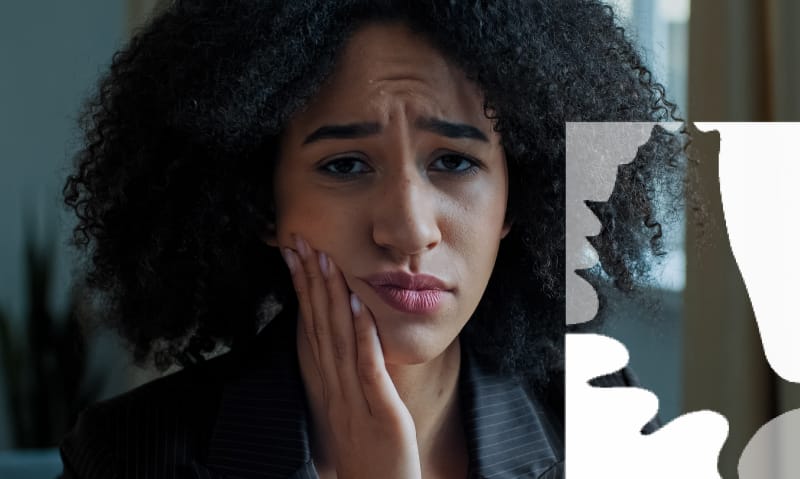Help! My Gums are Bleeding. What Should I Do?

Don’t ignore your bleeding gums.
Bleeding gums can often seem like a minor inconvenience that many brush off—literally and figuratively. Seeing a bit of pink in the sink after brushing or on your floss may not set off alarm bells. However, don’t let the prevalence of this experience fool you.
Bleeding gums should never be ignored. They are not a ‘normal’ part of oral hygiene; in fact, this clearly indicates something is amiss. Bleeding gums is often the first indication of gum inflammation or periodontal disease, conditions requiring prompt professional attention!
Today, we will explain why bleeding gums happen, what it means for your oral health, and what you can do about it.
What causes bleeding gums to happen?
Several factors can cause or exacerbate bleeding from the gums, but one of the most common culprits is poor oral hygiene.
Not brushing and flossing regularly can lead to excess plaque build-up, which eventually hardens to form tartar, causing your gums to bleed. But before you grab your toothbrush and floss enthusiastically, remember that brushing or flossing too hard can cause your gums to bleed. Always use a soft-bristled toothbrush, and don’t press too hard.
But there’s more to the bleeding gums story than just poor oral hygiene. Sometimes, they can also be a sign of gum disease, such as gingivitis or more serious, periodontal disease. If left untreated, these can lead to tooth loss and other health complications, so it should not be taken lightly.
Oral hygiene habits aside, gum tissue may be more delicate and likely to bleed for other reasons. For example, hormonal changes, especially those that occur during pregnancy, can make your gums more susceptible to bleeding. Some medications can also increase the likelihood of bleeding gums due to side effects like dry mouth or altered saliva production.
Don’t forget that your diet can impact your gum health too. Nutritional deficiencies, particularly in Vitamin C and K, can contribute to gum bleeding.
What should I do if my gums are bleeding?
If your gums are bleeding, your first action should be to call Dr. Rob to schedule an appointment. A professional assessment is crucial to identify the root cause of your bleeding gums and prevent any potential onset of gum or periodontal disease. Meanwhile, there are a couple of steps you can take at home to alleviate symptoms and promote healthier gums.
First, adopt a healthy oral hygiene routine. This includes brushing your teeth twice daily using a soft-bristled toothbrush and flossing at least once daily to remove plaque build-up in hard-to-reach areas. Be gentle to avoid causing further irritation to your gums.
Next, consider incorporating an antiseptic mouthwash into your routine. Using mouthwash can help reduce bacteria in the mouth, prevent plaque build-up, and promote gum health.
Finally, a saltwater rinse can temporarily relieve tender, bleeding gums. Mix a half teaspoon of salt with warm water and swish the solution in your mouth for a few seconds before spitting it out. The saltwater rinse can soothe inflamed gums and aid in the healing process.
What happens if bleeding gums are ignored?
Ignoring bleeding gums can often lead to a progression of gum disease, which, if untreated, may have serious implications for both oral and overall health. Initially, you might notice increased sensitivity in your teeth, particularly when consuming hot or cold beverages. This sensitivity is often due to gum recession, a condition where the gums pull away from the teeth, exposing more of the tooth or the tooth’s root.
In more advanced stages, gum disease, or periodontitis, can create pockets between the teeth and the gums. These pockets can become infected, and over time, the body’s inflammatory response to this infection, along with the bacteria, can break down the bone and connective tissues that hold the teeth in place. If left untreated, this can eventually lead to tooth loss.
But gum disease doesn’t only impact oral health. Research has indicated a correlation between oral health and overall health. Conditions like gum disease have been linked to health issues such as heart disease, diabetes, and respiratory diseases.
So, addressing bleeding gums early is not only good for your oral health, but it’s also an essential step in maintaining your overall well-being. Remember, the progression of gum disease is usually painless until it reaches an advanced stage; so don’t wait for pain before seeking help.
Have your gum health assessed at Valley Dental Clinic.
Don’t allow something as seemingly harmless as bleeding gums or gum tenderness to compromise your overall well-being. Your oral health is the gateway to your general health, and it’s essential to address any redness, puffiness, or other gum issues today before they escalate into severe health conditions.
Dr. Rob, your favorite dentist near Anchorage, is committed to providing top-notch dental care. At our Wasilla dental clinic, we have the expertise to assess, treat, and help prevent gum issues, ensuring you maintain not just a healthy smile but a healthy life. Schedule an appointment today and take the first step toward optimal gum health!